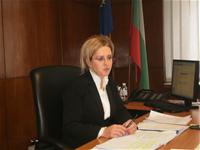How much actually costs Bulgaria's pariticipation in the European Stability Mechanism
Ralitsa Kovacheva, April 1, 2011
 Bulgaria's participation in the European Stability Mechanism (ESM) and the Pact for the Euro+ cause lively debates in the Bulgarian public domain. We in euinside consider these discussions being quite late, given the intensive debates on these issues at European level going on for months and which euinside wrote regularly about. We firmly believe that our country's joining the Pact for the Euro+ is an unequivocally the right decision and we have many times expressed clearly our position and our arguments. We do not question the participation of our country to the European Stability Mechanism either, because as a future member of the eurozone Bulgaria has to take its own share in the joint commitments. What was missing until now was official information on the specific parametres of the Bulgarian participation in the ESM. Here are the answers Deputy Minister of Finance Boryana Pencheva gave to euinside's questions:
Bulgaria's participation in the European Stability Mechanism (ESM) and the Pact for the Euro+ cause lively debates in the Bulgarian public domain. We in euinside consider these discussions being quite late, given the intensive debates on these issues at European level going on for months and which euinside wrote regularly about. We firmly believe that our country's joining the Pact for the Euro+ is an unequivocally the right decision and we have many times expressed clearly our position and our arguments. We do not question the participation of our country to the European Stability Mechanism either, because as a future member of the eurozone Bulgaria has to take its own share in the joint commitments. What was missing until now was official information on the specific parametres of the Bulgarian participation in the ESM. Here are the answers Deputy Minister of Finance Boryana Pencheva gave to euinside's questions:
euinside: Is Bulgaria's participation in the ESM voluntary or it ensues a priori from potential accession to the euro area when the criteria for membership are fulfilled?
Boryana Pencheva: The Mechanism is valid for all euro area countries and, therefore, for Bulgaria when it becomes a member. Before that our country has no fiscal commitments to the mechanism. The eurozone member states are legally binding themselves to participate with installments in the common subscribed capital of the ESM after they ratify the treaty for its creation.
euinside: How is the installment of each member state calculated according to the so called ECB key, which are the parametres envisaged in it and what is each parameter's share?
Boryana Pencheva: The share of installments for participation in the mechanism of each member state will be based upon the key for subscribed capital in the ECB, as for the countries with GDP below 75% of EU average, as is Bulgaria, an adapted key will be used. The first component is 75% participation on the basis of gross national income per capita and 25% is the part of the ECB's key. Thus the burden of population in the common key for Bulgaria's participation is 12.5% and the burden of GDP is up to 87.5%.
Nominally, Bulgaria's share will be 0.43% (according to the calculations up to date, given that all countries join the eurozone, which is the perfect scenario). This means approximately 340-350mn euro subscribed capital and around 2.6bn in callable capital. The total amount would be some 3bn euro (and not 6bn as some claim), but this is a matter of further future calculations.
I recall that we have no fixed date for eurozone membership and from this point of view any sum would be premature. The precise commitment for the transitional period will be clear by the time of accession to the euro area. The size of the installment will depend on the number of countries in the euro area, except from the gross national income by the time of accession.
euinside: Is this the final formula for calculating the installments or the discussion is going on and we could expect changes?
Boryana Pencheva: This is a consensus formula which reflects the positions of the smaller member states from Central and Eastern Europe (CEE) and Bulgaria's efforts after numerous bilateral and multilateral discussions.
euinside: Does Bulgaria have an opportunity to negotiate for reduction of its installment in the fund and if yes - with what arguments and how will the country try to achieve this?
Boryana Pencheva: Preferences have already been achieved in order to take into account the catching-up type of Bulgaria's development and of most of the CEE countries (with less than 75% of EU average GDP). It is supposed that in one moment or another Bulgaria will reach these standards, which is our strategic goal in terms of economic growth. If the formula, as agreed now, is maintained, it would be natural when GDP grows the formula to be kept.
euinside: When does the 12-year transitional period start, when the countries with GDP per capita less than 75% of EU average will pay less?
Boryana Pencheva: The period starts from the date of accession to the euro area.
euinside: There was a proposal of Sweden's Minister of Finance Anders Borg, supported by Bulgaria, the most indebted countries to pay the largest installments and, respectively - the less indebted countries to pay nothing or tiny sums. Has this approach been finally rejected during the negotiations of the ESM or is it still on the table?
Boryana Pencheva: This approach has been rejected because of the high indebtedness of a large part of the member states, not only old ones but also new. Today's situation imposes undertaking of solidarity responsibility for unwise policies in the past years.
This is why I think that all member states must commit to the Pact for the Euro+ as this political document is Europe's collective response regarding the need of a reasonable fiscal policy.
euinside: The ratification of the amendment of article 136 of the Treaty on the Functioning of the EU, with which the ESM is created, must be ratified by the National Assembly. Would this include the parameters of the Bulgarian participation in the mechanism as well?
Boryana Pencheva: The commitments in principle are yet to be approved by the European Parliament and then ratified by national parliaments. This will formalise the activities of the mechanism as well as the Bulgarian commitments. It is expected the European Parliament to approve the legislative proposals in the summer, so that the ratification process could start.
euinside: What are Bulgaria's arguments to join the Pact for the Euro+?
Boryana Pencheva: Bulgaria's reservations were related to the issue of a single tax basis in corporate taxation and the Bulgarian position has been taken as a point. As a result now we are talking about tax coordination which is something very much different. Bulgaria could participate in tax coordination, especially regarding fight against tax frauds and tax cooperation in general among the national tax administrations.
With its joining the Pact for the Euro+ Bulgaria is ensuring a fully fledged participation in the decision making process and we have already benefited from the opportunity to clearly defend our positions. We consider the Pact as an entirely political commitment which has to be taken by all member states of the EU as a strategic one that will guarantee close coordination of economic policies, will ensure predictability in the longer term regarding fiscal policies in particular, but most of all regarding member states' commitments to undertake the necessary structural reforms.
In short, the Pact is the collective European response to the effects of the crisis, which has to synchronise the efforts for fiscal consolidation with the prerequisites for an accelerated economic growth of the EU. Bulgaria will reflect its priorities in its National Programme for Reforms and the other strategic documents. Moreover, our ambition is to be among the first EU member states to present their priorities in Brussels.
euinside: Has this decision be approved by the Parliament?
Boryana Pencheva: The arguments for our joining the Pact for the Euro+ were presented by the Prime Minister in Parliament and on March 30 the Ministry of Finance presented its arguments in the appropriate parliamentary committees.
 | © European Parliament
| © European Parliament | © The Council of the European Union
| © The Council of the European Union | © European Parliament
| © European Parliament | © Ralitsa Kovacheva | www.euinside.eu
| © Ralitsa Kovacheva | www.euinside.eu